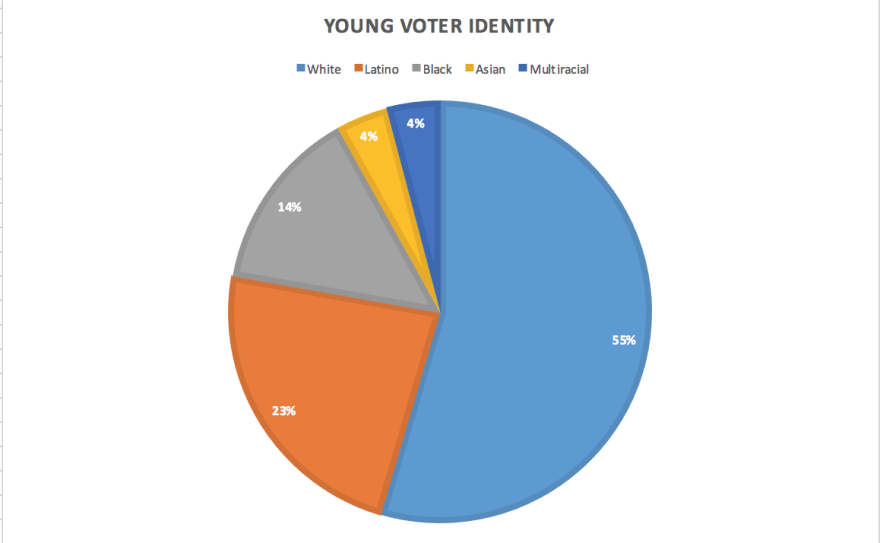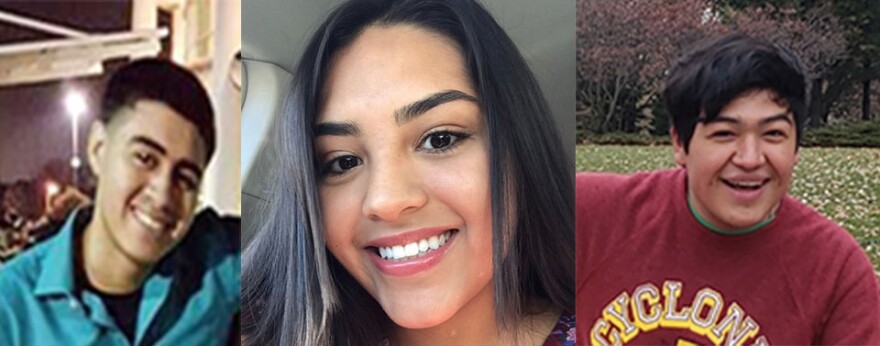For millions of young voters, the election in November will be their first time voting for president. That includes a large population of young Latinos, who make up almost a quarter of all eligible young voters.

Nez Castro, 19, Abraham Saldaña, 21, and Alexa Rodriguez, 20, are three of those eligible young voters. The Iowa State University students met virtually over Zoom to talk about their thoughts on the election this year.
They were pretty excited to share their thoughts. Saldaña said this is the first time anyone has reached out to him about this year’s candidates.
“Like it's all about politicizing everything at this point, they politicize the pandemic, they politicize all these different things, and it's just like toxic," Saldaña said.
Castro and Rodriguez each chose one word to describe their general thoughts about the election campaigns.
“I guess if I had to describe it in one word, it would be "frustrated" just because everything seems to be so disorganized," Castro said.
“My word would be "draining." It's definitely been really draining to just kind of been waiting and seeing kind of the election come down to two people who I really don't have a lot of trust in," Rodriguez said.
And if their thoughts about the election seem somewhat negative, Rodriguez and Saldaña said there is a reason for this.
“Politicians trying to speak Spanish or you know, playing Despacito in campaign events and that's just really disappointing because that's not what the Latino community is asking for at all. We're asking for solutions to these major systemic issues that keep us you know, essentially suffering," Rodriguez said.
Saldaña quickly agreed with Rodriguez: “Yeah, like she said about the Despacito thing, that's something that really turned me off about Joe Biden like he's trying to like pander different demographics.”
Castro said it's also because many times, politicians say one thing to the Latino community, but do something else once they are in office.
“I feel like a lot of politicians just really have nothing but hollow words to offer our community," Castro said.
The issues they said they really want politicians to focus on cover a wide range. But all the topics the students listed had one similarity: they want politicians to focus on how issues will specifically apply to, or affect, the Latino community. People like them. Things like immigration, health care, climate change and the economy.
Rodriguez said she understands how it may be more difficult for politicians to meet Latino communities where they are, but that it would be worth it.
“If anything, it's a challenge to really hear out the community around you and hear out oh, you know, what do my Latino neighbors feel about the current state of our country? How is this pandemic? How is health care? How is climate?" Rodriguez listed.
The students said the one way politicians can do this successfully, is by listening to Latino voters' concerns. Not just by releasing an agenda for their plan of winning the Latino vote. Castro and Saldaña say this doesn’t exist.
I think that the Latino vote is just kind of a big lie
“I think that the Latino vote is just kind of a big lie, because everybody's got different opinions. You can't just generalize an entire population with a specific set of viewpoints. It's really unfair," Castro said.
The students not only differed in opinion about some political issues, but their families originate from different countries with different backgrounds.
Saldaña said lumping all Latinos into one bloc is borderline racist.
"
“And then you're trying to like, put like a checkmark next to that," he said. "Oh, we got the Black vote. We got the Latino vote, like what is that? Try to talk to us like a human being. You know, I'm saying? Like talk about actual issues. Don't try to like cater to us.”
Castro followed up Saldaña's point with one that had both other students nodding their heads.
"There's also not something called the white vote either," Castro said.
But Rodriguez said the idea of one Latino vote also doesn't necessarily imply that all Latinos think alike, rather politicians trying to win over a powerful group.
“So I think it's more to encompass like, the reality of our community actually having a voice in the electoral process that is, you know, going to impact this election and future elections in a huge way that it hasn't ever before," Rodriguez said.
The students urge and advise politicians to refrain from referring to their vote as one giant "Latino voter" bloc and instead encourage understanding the diversity within the country's largest minority group.




